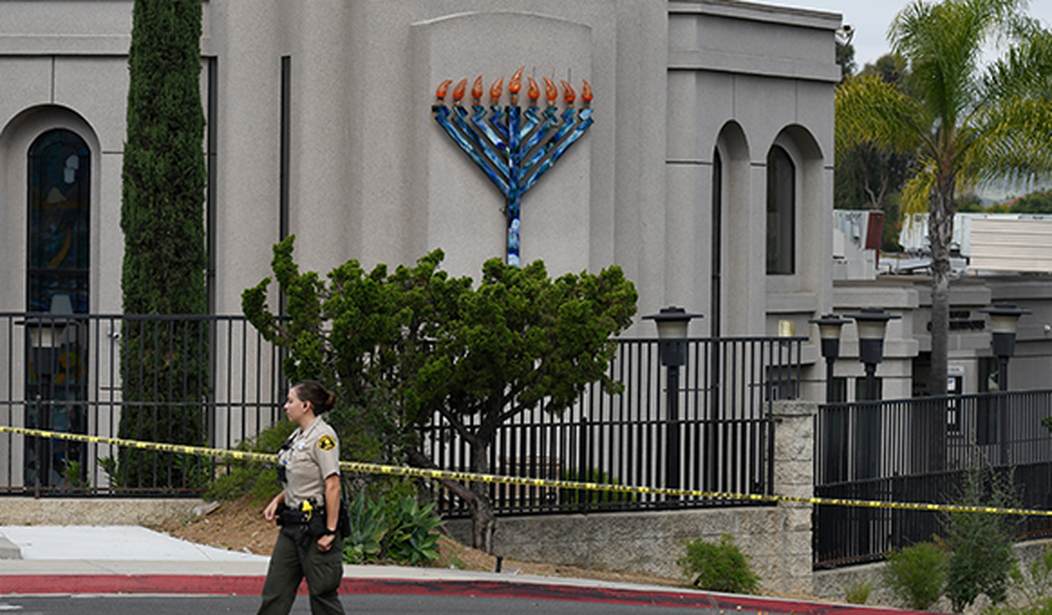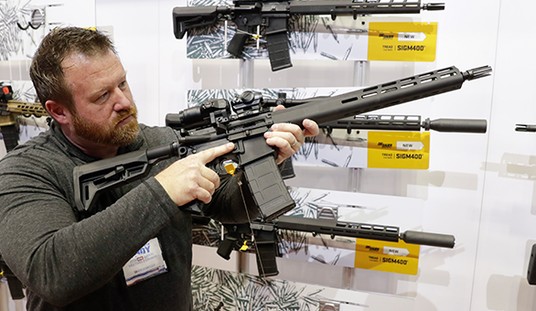On the last day of Passover in 2019 a 19-year-old man walked into the Chabad of Poway synagogue in Poway, California and opened fire, killing a 60-year-old woman and injuring three others, including the synagogue's rabbi. The shooter, who fled the synagogue after his gun jammed and was taken into custody by police a short time later, was ultimately sentenced to life without the possibility of parole for his shooting spree.
The gun control group Brady, working with some of the victims of the Poway shooting, filed suit against gunmaker Smith & Wesson, as well as San Diego Guns, the store that sold the rifle to the shooter. In 2021 a judge on Superior Court of California for San Diego County allowed the lawsuit to proceed despite the arguments from the gunmaker that the Protection of Lawful Commerce in Arms Act precluded lawsuits seeking to hold gunmakers responsible for the acts of criminals, but this week Superior Court Judge Wendy Behan granted Smith & Wesson's motion to dismiss after determining that the Protection of Lawful Commerce in Arms Act does apply to the case.
In her decision, Behan noted that while the PLCAA generally preempts civil actions for damages and injunctive relief against gun makers and sellers arising from the criminal misuse of firearms, there is a "predicate exception" that allows litigation when "where a manufacturer or seller knowingly violated a State or Federal Statute applicable to the sale or marketing of the product, where violation proximately caused the harm" that led to the lawsuit.
In this case, Brady and the plaintiffs contended that Smith & Wesson knowingly violated California’s prohibition on the possession of “assault weapons”, the federal prohibition on the sale of full-auto “machineguns”, and California’s prohibition on “deceptive, untrue or misleading advertising”. This was one of the first cases where a gun control group tried to argue that legally, there's no functional difference between a semi-automatic rifle and a full-auto machine gun, but Behan shot down that claim in her decision.
Plaintiffs allege that the rifle used in the shooting was a fully automatic "machinegun" because it could allegedly be modified, thereby violating 18 U.S.C. § 922(b)(4). However, the evidence shows the rifle used, the M&P 15, is a California-compliant semi-automatic rifle not designed to function as a machinegun.The US Supreme Court recently held in Garland v. Cargill (2024) 602 U.S.406, 410: “[s]emi-automatic firearms, which require shooters to reengage the trigger for every shot, are not machineguns” as defined in 26 U.S.C. § 5845(b). While plaintiffs argue that modifications could make the rifle illegal, there is no evidence that the shooter intended to or did modify the firearm. Forty-year-old ATF agency interpretations relied upon by plaintiffs are not binding on this court and ultimately lack relevance due to the lack of ambiguity in the statutory definition of a machinegun, which excludes firearms not originally designed for automatic fire. The evidence remains undisputed that that Smith & Wesson “S&W” manufactured the rifle as a semiautomatic firearm, and the shooter used the rifle as a semi-automatic firearm.
Gun control advocates, including officials for the city of Chicago, are making essentially the same argument in their lawsuit against Glock; that the semi-automatic pistols should be treated like they're full-auto machine guns because they can be illegally converted to full-auto fire. While Behan's ruling won't have a direct impact on that litigation, her reasoning can and should be applied to Chicago's lawsuit.
Behan also rejected Brady's assertion that the shooter modified his rifle by attaching a pistol grip, which they claim turned the rifle into an ""assault weapon" illegal under California law. The judge, however, ruled that the "undisputed evidence shows the rifle lacked any features that would classify it as an assault weapon, and there is no legal basis to claim it becomes one simply because it could be modified post sale."
The plaintiffs' also claimed Smith & Wesson's advertising violated California's Unfair Competition Law by "falsely imply[ing] extensive use by police agencies, and suggest[ing] that S&W's marketing promotes unlawful use of its products." Once again, Behan found the gun control group's arguments unpersuasive.
The shooter was no doubt “aware of Smith & Wesson.” After all, he purchased a S&W firearm. However, Plaintiffs make a leap in logic in arguing that the shooter’s mere knowledge of the S&W brand shows he was motivated to act criminally. Although after the shooting, the shooter told the 911 dispatcher that he had a “Smith & Wesson M&P 15 rifle” in his car, he did so only after being asked twice by the dispatcher, “What kind of weapons do you have?” It is decidedly unreasonable to infer that his answers to the dispatcher’s questions identifying the firearm is evidence S&W motivated him to act criminally.
The final allegation from Brady was that Smith & Wesson "had a duty to exercise control over San Diego Guns’ retail sales"; a claim easily dismissed by Behan.
However, this is a common law negligence claim, not a claim based on a violation of a statute applicable to the sale of firearms. On that basis alone, the claim is a qualified civil liability action subject to dismissal under the PLCAA. Even reaching the merits, the claim lacks evidentiary support. Plaintiffs argue that S&W had control over San Diego Guns “but chose not to exercise” it. There is no evidence that S&W exercised any supervisory control over the method and way San Diego Guns went about its business of selling and transferring firearms to its retail customers under federal and state law.
The shooting at the Chabad of Poway was the horrific act of a hate-filled individual who will rot in prison for the rest of his life as a result of his crime. Smith & Wesson wasn't responsible for his actions anymore than Budweiser or Absolut are responsible for the actions of drunk drivers. Behan made the right decision in dismissing the lawsuit against the gunmaker, and though Brady is likely to appeal her ruling, there's no valid reason for an appellate court to reinstate the group's claims.









Join the conversation as a VIP Member